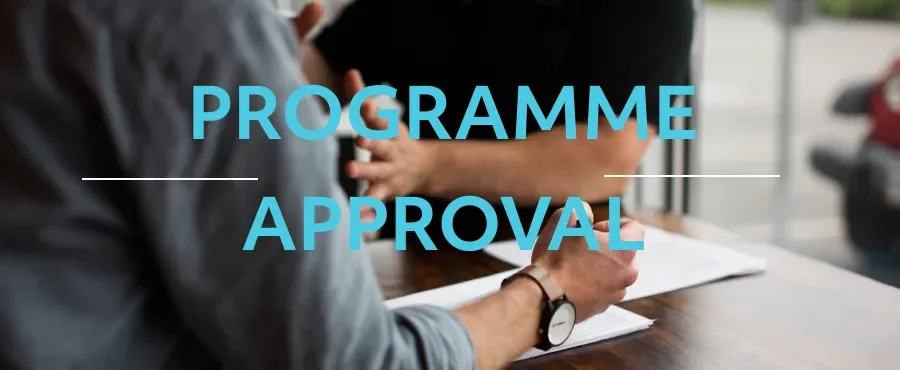

Programme Approval
As a University and Designated Awarding Body, DCU is responsible for the accreditation of its own programmes and awards, which are, in turn, fully aligned with the National Framework for Qualifications (NFQ). Every proposed new programme must undergo the University’s programme approval process, which involves validation (i.e. the assessment of the programme’s relationship to University strategy and its likely viability) and accreditation (i.e. the review of the programme by a panel of external subject matter experts to determine its alignment with academic standards and the appropriateness of its curriculum).
The following information is intended for those:
- Preparing a proposal for a new programme of study, which must undergo the University’s programme approval process.
- Preparing significant revisions to an existing programme, which must be considered as a revised academic offering.
A proposal for a new programme may only progress to the University’s programme approval process after it has gone through the necessary consultation and approval procedures in the relevant Faculties. Programme proposers should discuss any proposal for a new programme with relevant Faculty colleagues. Programme proposers are also advised to engage with the Academic Secretariat at this point through their Faculty Office.
DCU has developed clear criteria for the validation and accreditation of new programmes of study and established effective mechanisms and procedures for programme approval. These are set out in the Programme Approval Guidance Document
The University is committed to ensuring, on the one hand, that all new programme proposals have a clear strategic focus and are fully aligned to the University’s strategic plan and component strategic plans and, on the other, that programme proposers have at their disposal a set of procedures designed to maintain the highest possible quality in terms of the preparation of proposals. Programme approval at DCU involves both validation and accreditation ensure, and these separate but related activities ensure that:
- Individuals and groups are facilitated in creating new programmes of study within the University and/or in partnership with other institutions or organisations as appropriate.
- Each proposal for a new programme of study meets the requirements of Academic Council for the relevant award, and the standards and learning outcomes are appropriate to that award.
- Necessary human, financial and physical resources are available.
Validation is the first stage of the approval process and involves the Education Committee assessing new programme proposals on a number of criteria.
In instances where a proposal involves a partner organisation, an alternative validation form is required. Further information can be found on the Collaborative Provision webpage.
Please note that Education Committee will only consider proposals that have gone through the appropriate approval procedures in the relevant Faculty/Faculties. Advice on approval procedures within a Faculty should be sought from the Faculty Office and the Associate Dean for Teaching & Learning.
Summary of the Validation Approval Process
|
Faculty approval of validation proposal |
|
Submission to Education Committee |
|
Decision by Education Committee or referral to Education Committee Standing Committee |
|
Outcome communicated to Programme Proposer and other involved colleagues |
|
Validation report submitted to Academic Council |
|
If approved, proceed to accreditation |
Accreditation is the second stage in the approval process and involves the submission of a detailed programme proposal to an Accreditation Board. This board includes a group of academics, and as appropriate, other professional experts from outside the University. The role of the Accreditation Board is to consider whether the programme meets the nationally and internationally accepted requirements for the award(s) to which it is designed to lead.
An accreditation proposal template can be found on the A - Z Forms webpage here.
Summary of the Accreditation Approval Process
|
Date for Accreditation Board meeting agreed |
|
Submission of accreditation proposal |
|
Meeting of Accreditation Board |
|
Outcome communicated to Programme Proposer and other involved colleagues |
|
Accreditation report submitted to Academic Council |
|
If approved, submission of finalised documentation and preparations for launch |
Where changes are being made to an existing programme that does not require re-accreditation, different procedures are followed. Such proposals are submitted to Education Committee for consideration and recommendation using the Revised Academic Offering Form on OVPAA's A - Z Forms page. Proposals will only be considered once they have been approved by the relevant Faculty or Faculties.
The following summarises the approval pathways for proposals:
|
Proposal |
Approval pathway |
|
Significant restructuring of a programme (major award) |
Faculty approval and referral to Education Committee for consideration and recommendation |
|
Development of non-major award where the underlying module learning outcomes are mainly derived from an existing accredited DCU award |
Faculty approval and referral to Education Committee for consideration and recommendation |
|
Creation of exit award from existing major award |
Faculty approval and referral to Education Committee for consideration and recommendation |
|
Change of delivery mode (from traditional to online or blended delivery) |
Faculty approval and referral to Education Committee for consideration and recommendation |
|
Re-titling of existing programme |
Faculty approval and reporting to Education Committee on annual basis |
|
Change of delivery mode from part-time to full-time or vice versa |
Faculty approval and reporting to Education Committee on an annual basis |
Online and Blended delivery: In instances where a proposal involves online or blended delivery, please refer to the following documents:
The Programme Approval Process
Validations
- For standard validations (i.e. standard DCU Award with no partners), the (AA1) form can be used.
Accreditation
- The standard Accreditation Proposal Template can be found here.
Revised Academic Offerings
- Where changes are being made to an existing programme that does not require re-accreditation, use the Revised Academic Offering Form.
